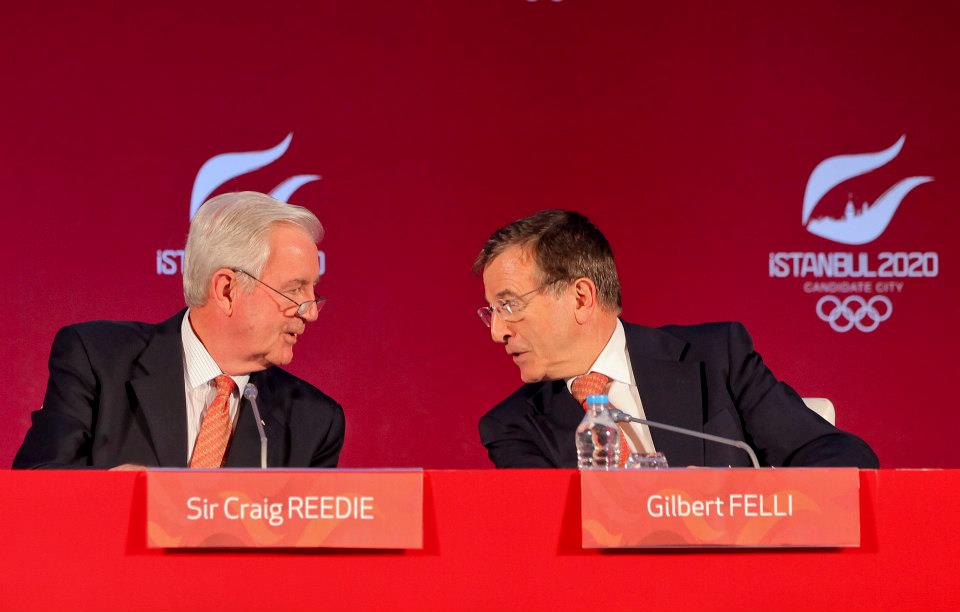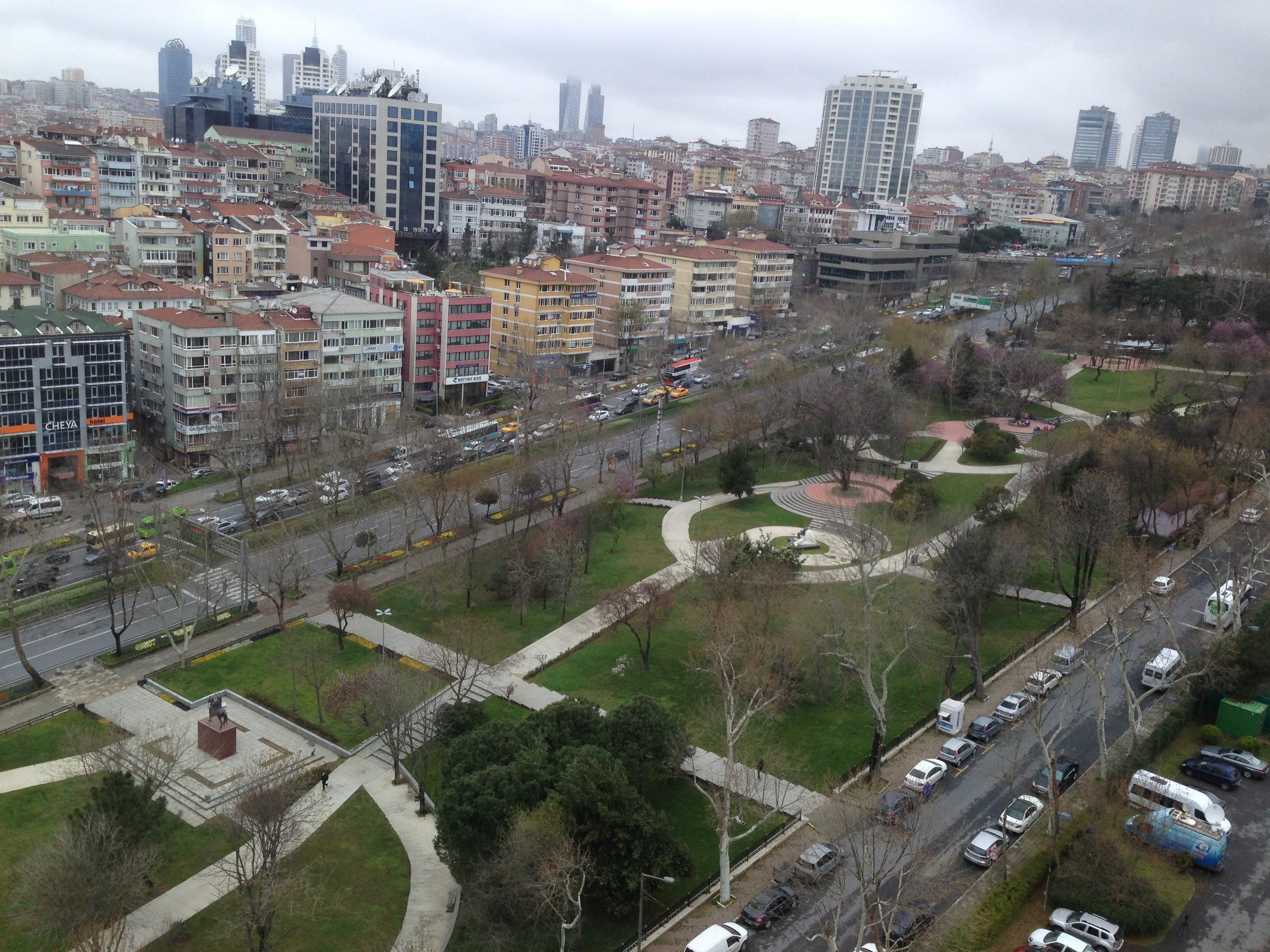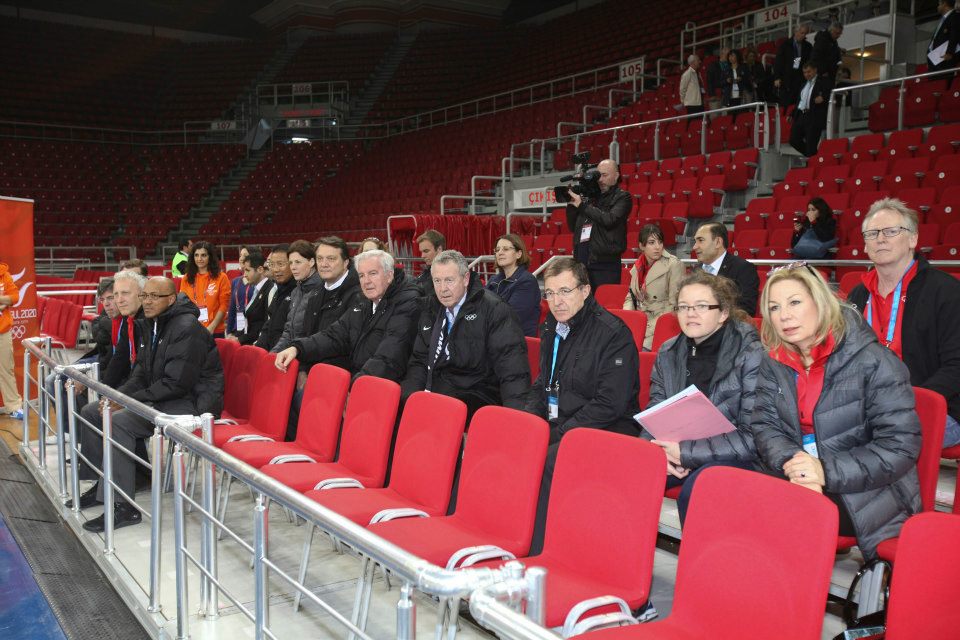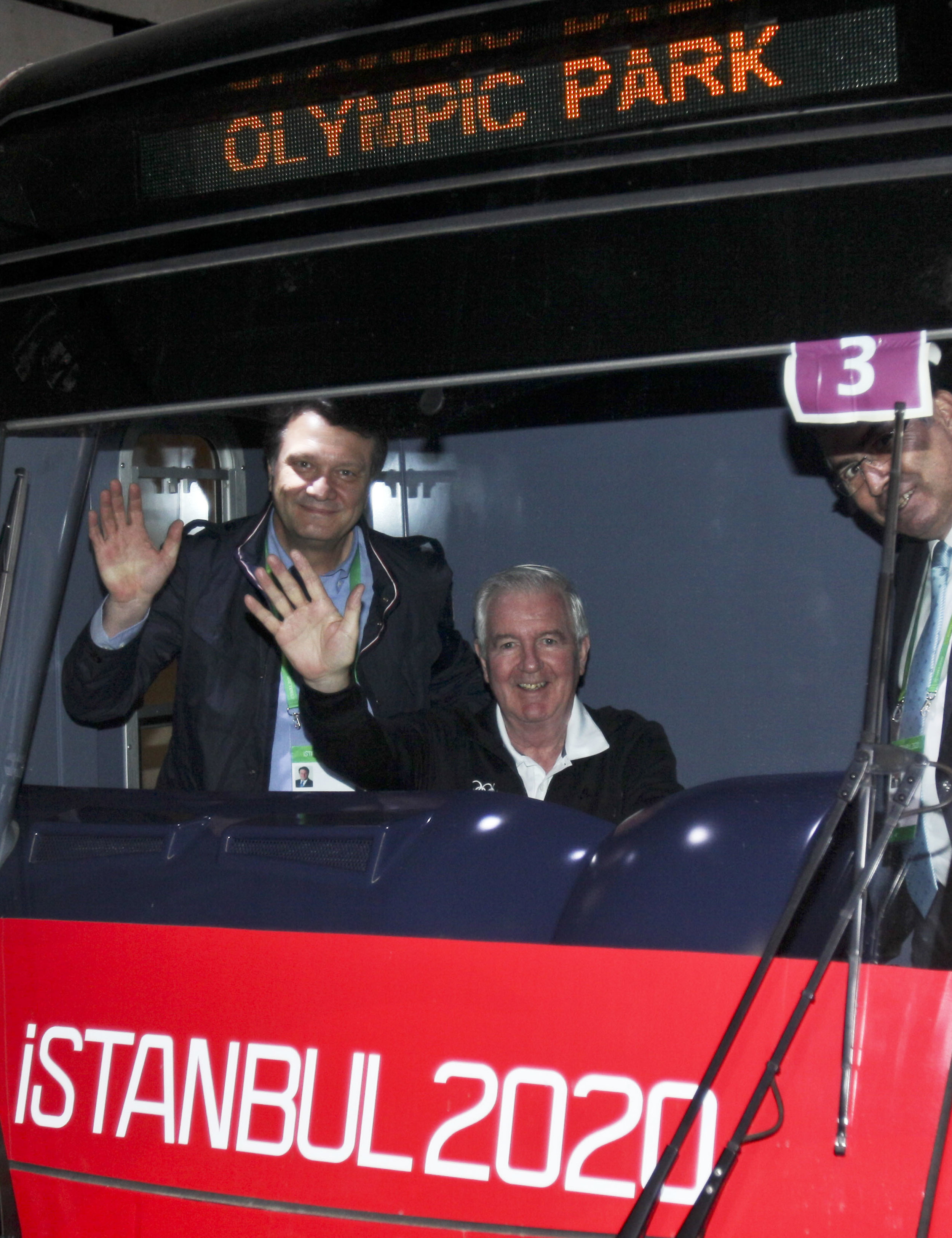ISTANBUL -- No one ever said they weren't anything but smart and clever here. They knew coming in, because the working group report last spring from the International Olympic Committee said so, that transport issues are -- and will be -- problematic in a city growing so fast it's hard to keep up.
The rhythm of the four-day IOC evaluation commission package inevitably features afternoon site visits. On Day Two, the members checked out, among other locations, a waterfront cluster, which naturally enough includes the marina for Olympic sailing. The sun started sinking lower; time to get back. Uh-oh -- it was rush hour.
Ah, but these Turks had thought of that. Truth be told, traffic was not so bad for a Monday workday. Even so, the IOC made its way back to its hotel base not on the roads but by fast boat, the sea breeze brisk and refreshing.
Istanbul made an "excellent impression," Sir Craig Reedie, the head of the evaluation commission said at a Wednesday news conference, quickly adding that in his world "excellent impression" was "exactly the same" as "hugely impressed," the phrase he used to describe Tokyo, or "greatly impressed," what he said about Madrid.
The news conference Wednesday wrapped up the evaluation commission's tour of the three 2020 cities. It saw Madrid last week. It visited Tokyo March 4-7. It will now set to work on producing a report that will be released at some point before the IOC's all-members July 3-4 session on the 2020 candidates in Lausanne, Switzerland.
The IOC will pick the 2020 winner Sept. 7 by secret ballot at a vote in Buenos Aires.
The evaluation report will by design focus on the so-called "technical" process of the campaign -- how many roads, subway lines, sports venues, hotel rooms and so on are already on the ground or would need to be built for each of the cities to get ready by 2020.
Already, however, the outlines of the three bids can be fairly characterized:
The Tokyo bid, it can be said, is spearheaded by city government. Madrid might be portrayed as a sports project. And Istanbul is for sure a national effort.
Istanbul's bid would spend $19.2 billion on infrastructure costs. That's 10 times more than Madrid, at $1.9 billion. Tokyo's capital costs come in at $4.9 billion.
This is Istanbul's fifth bid. It is Madrid's third in a row, Tokyo's second straight.
The commission will be keen to write a report that offers a clear differentiation. That way the members can be offered a distinct choice. As it turns out, this 2020 race, even if it can not be said at this preliminary stage to have a front-runner, will likely present many if not most IOC members with a threshold decision.
It's -- what to do about Istanbul?
Madrid and Tokyo absolutely have their cases to make.
Madrid, with 28 of 35 venues already on the ground, wants to re-define the idea of "legacy," to re-purpose the Olympic movement so that it becomes something well beyond just buildings and metro lines, instead a source of inspiration for "healthy living and healthy habits," as Spanish Olympic Committee and Madrid 2020 president Alejandro Blanco put it, and particularly for young people.
That $4.9 billion for Tokyo? It literally is just sitting there, banked, waiting, in today's uncertain economic climate. You want safety and security? Along with Japanese high-tech? The economic clout of the world's third-largest economy? Tokyo's amazing metro and rail system? Plus, like Madrid at night, Tokyo is -- fun.
Not to say Istanbul isn't. They even put on a fireworks show here Tuesday night for the IOC.
Here is the difference:
Istanbul fits the mold of recent IOC winners. The Turks -- again, they notice these things -- picked up on what worked, and have more or less designed their bid to fit that mold.
The issue is whether this strategy will still prevail, or whether -- and especially in light of developments in Sochi and Rio de Janeiro, sites of the 2014 Winter and 2016 Summer Games -- it has played out.
In the 1982 movie "Fast Times at Ridgemont High," a shirtless Sean Penn, playing the surfer dude Jeff Spicoli, walks into a hamburger joint with two of his buddies and says, ever-so-memorably, "Who's got the beaucoup dollars today?" Actually, Spicoli pronounces "dollars" as "dolares," so much the better.
Does the IOC want to keep spending the beaucoup dolares? Or not?
If it does, your winner Sept. 7 will be Istanbul, where $19.2 billion buys you powerful "legacy" in the form of another huge construction project on the order of Beijing 2008, London 2012, Sochi 2014 and Rio 2016 -- all, obviously, winners.
The corollary question, perhaps, is whether it also buys you headaches like in Sochi (construction costs already north of $50 billion) and Rio (significant delays evocative of Athens 2004, officials announcing Tuesday they are closing the stadium due to host track and field at the 2016 Games because of structural problems with the roof, and this at a facility built for the Pan Am Games in 2007).
Reedie -- and it should be emphasized that he was speaking generally, not referring to any bid specifically -- addressed the topic at the closing news conference last week in Madrid. He said, "The IOC are very well aware that the Games simply can not get more expensive, more expensive and more expensive."
Next:
There's no getting around the fact that traffic in Istanbul is congested. They are making a huge -- repeat, huge -- effort to do something about that, including construction of a $4.5 billion metro tunnel under the Bosphorus (that amount is included in the $19.2 billion).
They might experiment with flex-time work schedules, special congestion pricing for inner-city road usage, PR campaigns for mass-transit use -- anything and everything to get people out of their cars and onto the trains, in hopes of reducing car use by 30 percent in 2020. Will it work?
They made a point of saying, repeatedly, that such projects are all part of Istanbul's master plan -- that they're going to get done whether the Olympics are coming or not. Yet they're right there in the bid book budgets. So which is it? Both?
The four-cluster venue plan in Istanbul virtually guarantees, meantime, that transport is likely to be the No. 1 technical issue in the evaluation report. Last spring's report noted travel times would be "substantial" and average estimated speeds seem "too optimistic for current traffic conditions."
Speaking of Turkish optimism, a senior transport minister, Muzaffer Hacimustafaoğlu, at a news conference Tuesday, declared that in 2020, "We will aim to make the transport experience immune from unforeseen events." Asked a few moments later to clarify, he said, "I don't think there will be any big surprises."
Meanwhile, a factor that has gotten virtually no scrutiny whatsoever -- yet -- is that the current IOC Games executive director, Gilbert Felli, will be stepping down soon. He has more than 20 years experience. If the IOC votes for Istanbul, these Games presumably would be in the hands of his successor, Christophe Dubi. On Dubi's watch, does the IOC want to take on another massive project?
These are all legitimate questions.
As are other factors, some geopolitical, that also may weigh on the vote:
-- The IOC has in recent years not just opted for big projects but gone to cities and countries keen to make plain their station in the world -- China, Russia and South Korea, in particular. Turkey would fit that pattern precisely, bid chairman Hasan Arat noting in an interview Wednesday with a small group of international journalists the impact the 1988 Seoul Games had on Korea and in turning Barcelona into a world-class destination after 1992, declaring, "It's a great opportunity."
-- Istanbul is a hot tourist destination. Feza Solaklar, the bid's head of accommodation, said Tuesday, that it is now the third-most popular destination in Europe, after London and Paris.
-- One of Istanbul's major selling points is that it would offer the IOC the chance to take the Games to a Muslim nation for the first time. In the Eurocentric IOC, how does that play -- positively, not or makes no difference?
-- Unsaid in that selling point -- but well-understood in IOC circles -- is that a vote for Istanbul would probably take Doha, the Qatari capital, out of the bid game for 20 years. There are elements within the IOC who would view that with favor and those who assuredly would not.
-- The conflict in Syria, on Turkey's eastern border -- they sought here this week to downplay that, understandably enough. How, if at all, will that conflict, figure into the vote?
In Istanbul, they know they have a real chance at 2020. Indeed, they have a confidence that borders -- already -- on something close to bravado.
The president of the country, Abdullah Gül; bid leader Arat; the sports minister, Suat Kiliç -- each of them used the word "deserve" this week. As in, Istanbul deserves the Olympics.
Asked to explain the word choice, Kiliç said at a Monday news conference, his comments translated to English, "As a Turkish delegation, we did not say anything negative. We did not make negative comments about the other candidates. Olympic ethics and morals are involved. We are competitors. That doesn't mean we should treat them bad. We don't belittle them. We don't underestimate them. We don't treat them bad. We don't make negative comments. But I am a Turk. I am minister of youth and sport.
"… I share what I believe is true regarding Istanbul. I have used the appropriate discourse for that. Istanbul is a candidate city. I have to use a discourse which fits this identity. We are also a modest city. We are open to all diversities.
"… Istanbul will show itself to you. We are trying to tell you to what extent we are ready to host the Games, to what extent we want and are willing to host the Games. The words we are using reflect our excitement [and] the commitment of the government … please look at my words from this point of view."
For a group that is indeed very smart and very clever, "deserve" -- and such a round-about way to explain it -- seems off-message, indeed. Typically, humility plays better in bidding campaigns within the International Olympic Committee.
After all, it's a long, long way until September.










